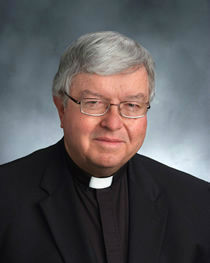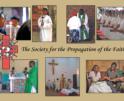
Faith
Genuflecting with the right knee is reserved to God alone as a sign of divine worship.

Doyle
Q. Growing up, I was always taught to genuflect with the right knee. But now I see more and more people using their left knee. Has there been a change that I am not aware of? Is it permissible to alternate knees? (Johnstown, Pennsylvania)
A. Right is right. According to the General Instruction of the Roman Missal, "a genuflection, made by bending the right knee to the ground, signifies adoration, and therefore it is reserved for the Most Blessed Sacrament" (No. 274).
The custom was formally approved by the Roman Catholic Church in the early 16th century. (Note that it is only practiced in the Western Church; Eastern Catholics and members of the Orthodox Church use instead a profound bow as a sign of their deep reverence.)
Genuflection on the left knee was used to pay honor to kings and emperors (and, at certain times in the church's history, to the bishop of one's diocese), but the right knee is reserved to God alone as a sign of divine worship.
I can't resist revealing one further thought when I receive a question like this one. I wonder if it really matters a lot to God whether someone uses the right knee to genuflect or the left -- especially when, according to the United Nations, about 21,000 people in the world die each day from hunger. I believe that God pays more attention to our hearts than to our knees.
Q. The other day I was told that if a baby, born to Catholic parents in a Catholic hospital, is in danger of dying, it is routine practice for a nurse -- or whoever is available -- to baptize the baby as soon as possible. But what if the parents are members of some other Christian tradition -- or no religion at all?
Would their permission be needed? (I knew a nurse many years ago, a Catholic, who worked in the nursery of a nondenominational hospital. She never told me in so many words, but I got the idea that she made a practice of baptizing any baby whose condition was uncertain.) (Davenport, Iowa)
A. Ordinarily, the sacrament of baptism is administered only by a bishop, priest or deacon. An exception is made when death is imminent. In that case, the Code of Canon Law indicates that baptism may be administered by anyone who has the proper intention (No. 861).
Ordinarily, too, the permission of at least one parent is necessary for a child to be baptized (No. 868); but again here, there is an exception: In danger of death, the sacrament may be administered against the parents' wishes. But the question is whether it should be.
St. Thomas Aquinas taught in the Summa Theologica that children of Jews and unbelievers should not be baptized against their parents' wishes and that to do so would be "contrary to natural justice."
Certainly, in the view of the Catholic Church, baptism is the ordinary and surest way to salvation. The Catechism of the Catholic Church states: "The church does not know of any means other than baptism that assures entry into eternal beatitude; this is why she takes care not to neglect the mission she has received from the Lord to see that all who can be baptized are 'reborn of water and the Spirit'" (No. 1257).
However, the catechism also says: "The great mercy of God ... and Jesus' tenderness toward children ... allow us to hope that there is a way of salvation for children who have died without baptism" (No. 1261). The nurse you mentioned should have first tried, if possible, to determine the parents' wishes and then proceeded accordingly.
- - -
Questions may be sent to Father Kenneth Doyle at askfatherdoyle@gmail.com and 30 Columbia Circle Dr. Albany, New York 12203.
- Father Kenneth Doyle is a columnist for Catholic News Service
Recent articles in the Faith & Family section
-
Did you know?Father Robert M. O'Grady
-
Sowing the Seeds of FaithMaureen Crowley Heil
-
Bread left overScott Hahn
-
Scripture Reflection for July 28, 2024, Seventeenth Sunday in Ordinary TimeJem Sullivan
-
What the universal call to holiness entailsDr. R. Jared Staudt


















